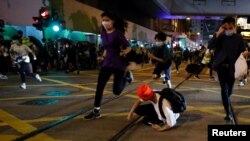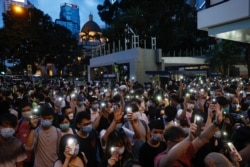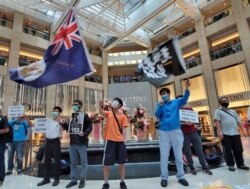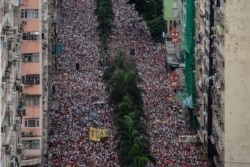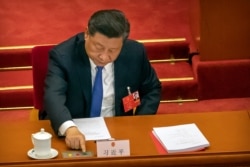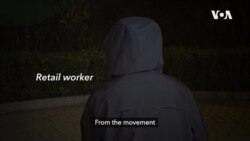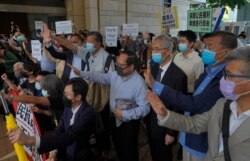More than 50 people were arrested in Hong Kong on Tuesday night after thousands of protesters defied a police ban to mark the first anniversary of the city’s anti-government movement on Tuesday evening.
People began gathering at the downtown Chater Garden in the business district of Central in the early evening. Some held up banners saying "Hong Kong Independence" and shouted slogans. Dozens of riot police descended on them and conducted body searches on many. They ordered crowds to leave, saying they were taking part in an unapproved gathering and would arrest them if they did not abide. A man who swore at police officers was swiftly detained while crowds chanted anti-police slogans.
Later, protesters spilled onto the streets and merged with a crowd who were leaving work in the financial district. People formed into a line and started marching as they chanted slogans, held up torchlights on their mobile phones and waved banners mostly emblazoned with messages demanding independence from China. Many also put up umbrellas in case police fired tear gas.
“Rejuvenate Hong Kong, revolution of our era!”, “Hong Kong independence, the only way!” they shouted.
Riot police charged at protesters a couple of times later in the night, using pepper spray to disperse the crowd, who cursed the officers loudly as they were being surrounded. Officials say the 53 people arrested have been charged with various offenses including unlawful assembly and participating in an unauthorized assembly.
Earlier in the day, hundreds also staged protests in seven shopping malls across the Asian financial hub at lunch time.
The throng of demonstrators chanted pro-democracy slogans and displayed banners saying “Hong Kong Independence” and “Liberate Hong Kong, Revolution of our times." The crowds also sang choruses of “Glory to Hong Kong,” the unofficial anthem of the movement.
“I came with a heavy heart, the young people have given so much to this movement. They did it not for themselves but for Hong Kong, for justice. I owe them too much,” said a 53-year-old man who gave his name as Roger.
He was referring to the more than 8,900 people, of whom about 40% were students, who have been arrested in more than 1,000 protests since June of last year.With the looming national security laws imposed by China many said they wouldn’t stop the resistance but would take a more cautious approach. The new law is expected to be enacted within the next few months.
On June 9 last year, some one million Hong Kongers staged a peaceful protest against a proposed extradition law that would allow individuals to be sent to China for trial. The government at the time insisted on pressing ahead with the law, prompting more people to take to the streets in a series of mass protests that plunged the former British colony into one of the deepest crises in its history.
Intending to stamp out protests, China’s legislature in late May passed a plan to force sweeping national security laws on Hong Kong to prevent and punish “acts and activities” that threaten national security, including advocacy of secession, subversion, terrorism and foreign interference.
Bypassing Hong Kong’s legislature, China’s vaguely defined national security laws will be applied to Hong Kong through an annex of the city’s mini-constitution, the Basic Law. The legislation would also allow Chinese national security organs to set up agencies in Hong Kong.
A 14-year-old boy in a school uniform said his first protest on June 9 last year was an eye-opening experience. “Last year we were fighting against the extradition law, this year we're fighting against the national anthem and national security law,” he said. “Now I know how brutal police can be and how horrific the regime can be.”
The scale of protests has markedly reduced in recent months, after the onset of the Coronavirus epidemic in early January. Police have repeatedly turned down applications for demonstrations, citing coronavirus restrictions. Many activists who have turned up at unapproved protests have been charged with participating in illegal assembly.
In April, 15 high-profile pro-democracy figures, including Martin Lee and Jimmy Lai, were arrested on the charge of illegal assembly for taking part in protests last year that had not been sanctioned by police.
Asked by reporters about the year-old protest movement, Hong Kong’s leader, Carrie Lam, said everyone needs to "learn a lesson" from the challenges and people should understand that Hong Kong cannot cope with “chaos.” She lambasted a call for a general strike over the new security laws when the city is facing economic recession.
An alliance of more than 20 labor unions and a students' group have planned to hold a referendum on June 14 to ask members whether they would go for a general strike to protest the laws imposed by Beijing.




